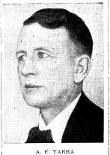'Commencing as a journalist, he decided to go in for fiction and gave up his job on a newspaper to become a cattleman in the wild west of Queensland. There he rode stock horses for a living, with the famous scrub riders, up and down the Warrega, the Paroo, the Mooni, the Ballonne, Nebine, Condamine and other famous cattle country rivers. He learned to hunt wild horses, ride buck jumpers, muster herds of wild, short horn cattle; mingle with the gamblers in the out-back shanties; fight the great bush fires in time of drought; swim the cattle over flooded rivers in the tropical wet seasons; wander over the desert country with only a solitary blackfellow [sic] as a companion; camp out on the ground under the stars; and wheel the leaders of a thousand head of wild Gulf cattle when they stampeded through the scrub. He went to sea as a sailor to get local colour for sea-going chapters; worked on the gold fields in order that he might gather material for a novel of the diggings; entered a gymnasium and trained with professional boxers to get the right atmosphere for a sporting novel. He roamed the Alps in New Zealand, searching for local color and scoured the timber country in Tasmania looking for he-men to write about. It was said by Australian editors who published his short stories that there was no living writer of fiction of note who knew as much about the great island continent and its people as Mr. Yarra. At the end of five years of travel and adventure, he settled down to journalism again and made ready to use his great store of material, which was gathered into a tin trunk full of closely written notebooks, reposing under the bed in a western Queensland, small town boarding house.
'But just then the war broke out and the budding young author was with the first contingent of Anzacs that stormed the heights of Gallipoli. He was still with them when, at Kitchener's orders, the sensational evacuation of the Peninsula was made, after seven months warring against the Turk on his own soil. With the First and Second Divisions he was in most of the general engagements in France, and returned to Australia to become an editor and newspaper proprietor. His hobbies are ringside seats at boxing matches, politics, buckjumping shows, English plays, the books of Edgar Wallace, Raphael Sabatini and P. C. Wren.'
Source:
'An Author's Training', Horsham Times, 10 January 1930, p.6.
 1191138288067910086.jpg
1191138288067910086.jpg